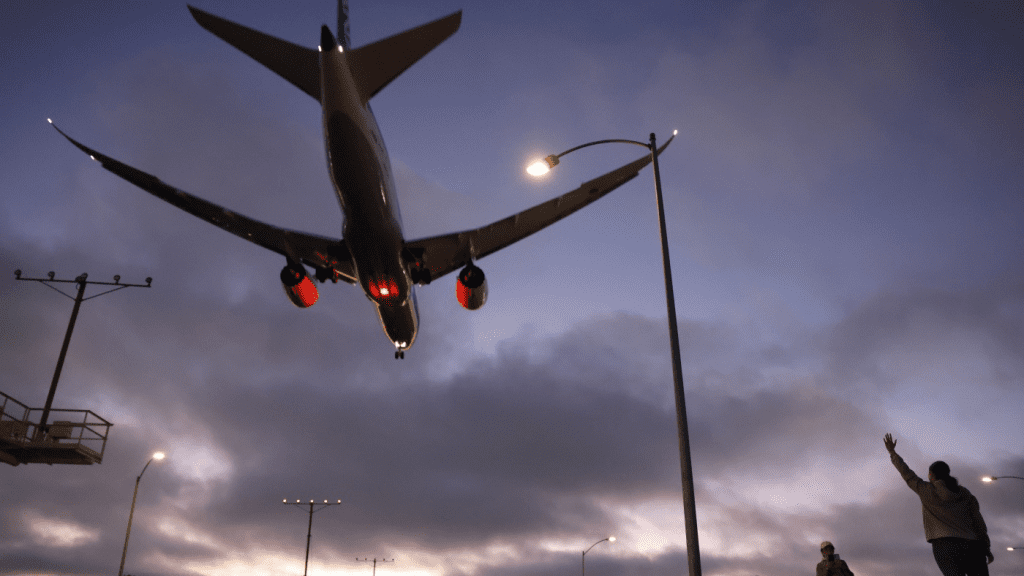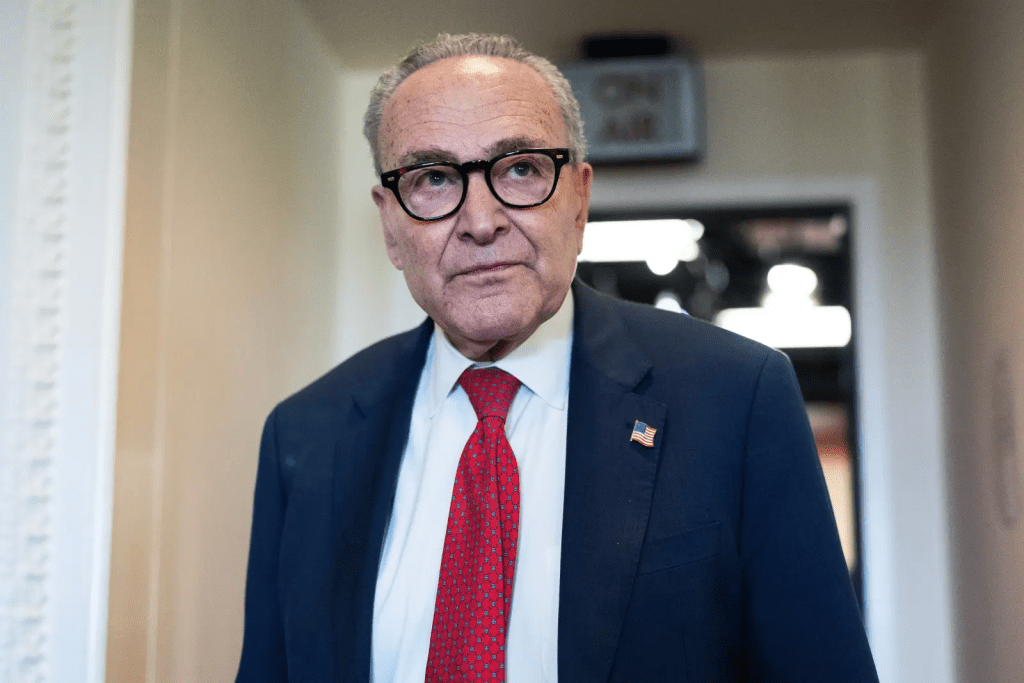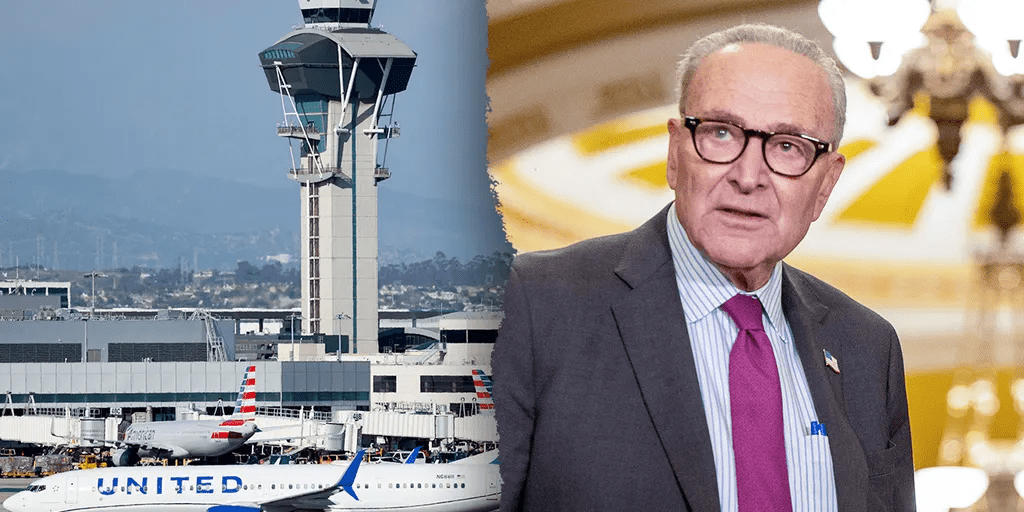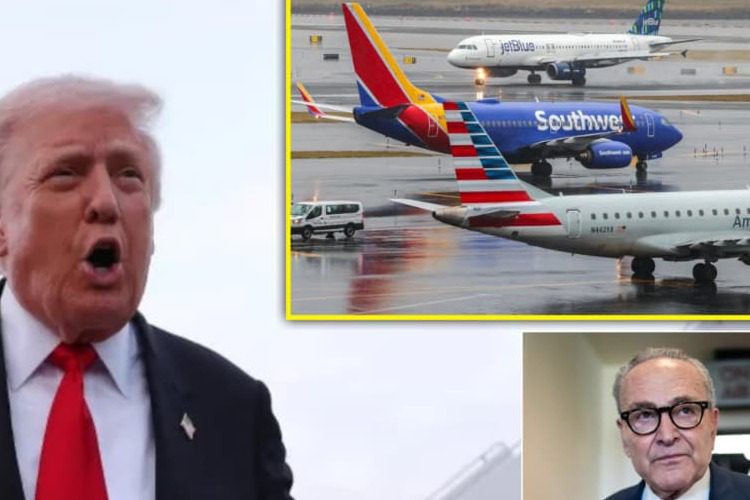From Grounded Dreams to Soaring Relief: Trump and Republicans Crush Chuck Schumer’s Shutdown Stunt
In the bustling haze of Hartsfield-Jackson Atlanta International Airport, where the hum of jet engines usually drowns out the chatter of hurried travelers, Sarah Mitchell clutched her two-year-old’s hand on November 10, 2025, her eyes scanning the departure board like a prayer unanswered. The board, once a mosaic of on-time flights, now flickered with delays and cancellations, a cruel mosaic of a week-long government shutdown that had grounded her family’s long-awaited trip to Grandma’s in Ohio. Sarah, a schoolteacher from suburban Decatur whose husband’s construction job had already taken a hit from the economic ripple, felt the tears well as her toddler tugged at her sleeve, oblivious to the federal feud that had furloughed 1,800 air traffic controllers and slashed flight schedules across the nation. “We just wanted to see her smile again,” Sarah whispered to her husband over the phone, her voice cracking amid the din of frustrated announcements. But as the clock ticked past midnight, news broke like dawn through clouds: President Donald J. Trump had signed the bill ending the shutdown, a Republican stand against Senate Minority Leader Chuck Schumer’s demand for Affordable Care Act subsidy extensions. By November 14, the FAA confirmed flight restrictions halved from 6 percent to 3 percent capacity cuts, averting a projected 10 percent plunge and restoring over 1,200 daily flights. For Sarah and millions like her, it wasn’t politics—it was the sweet rush of relief, a heartfelt homecoming made possible by leaders who held the line when the skies seemed to fall.

The saga that led to this skyward sigh began in the marbled corridors of the Capitol, where partisan lines hardened like frost on a winter runway. The shutdown, triggered on November 3 by Democrats’ insistence on extending ACA subsidies set to expire at year’s end—a $50 billion lifeline for 13 million enrollees—grounded federal operations for seven grueling days, the longest since the 2018-19 impasse that shuttered national parks and delayed tax refunds. Republicans, fresh from Trump’s 312-electoral-vote landslide and a House majority of 220-215, viewed it as Schumer’s gambit to force concessions on healthcare amid Trump’s vow to repeal Obamacare’s “disastrous” mandates. Schumer, the Brooklyn veteran whose filibuster-proof Senate minority still wields procedural power, dug in, his floor speeches a blend of righteous indignation and raw politics: “This is about protecting families from Trump’s axe on the ACA—not games.” But as furloughs hit 800,000 workers and the FAA warned of “catastrophic” controller fatigue, the pressure mounted. Air traffic controllers, essential but unpaid, called out at rates 25 percent above normal, their exhaustion a ticking bomb in towers from LaGuardia to LAX. Transportation Secretary Sean Duffy, Trump’s Wisconsin firebrand, didn’t mince words in a November 6 presser: “We’re cutting flights to keep the skies safe—4 percent now, 10 percent by Friday if this drags on.” It was a stark ultimatum, one that stranded 150,000 passengers daily and cost airlines $300 million in refunds, per Airlines for America data.

Sarah’s story at Atlanta’s world’s-busiest hub captured the human toll in vivid strokes, a microcosm of the chaos that rippled from coast to coast. Hartsfield-Jackson, with 2,600 daily flights, saw 200 cancellations on November 9 alone, families like the Mitchells rerouting through Charlotte or Chicago only to face more mayhem. “My little boy’s first flight, and it’s to a gate that doesn’t exist,” Sarah recounted later, her laugh hollow as she rocked him in a terminal rocking chair, the board’s reds and yellows blurring through tears. Across the tarmac, Delta pilots idled in cockpits, their union warning of “safety roulette” as controllers juggled six-day weeks without pay. The FAA’s phased cuts—4 percent on November 6, ramping to 6 percent by the 10th—weren’t bluster; they were born of data, with near-misses up 15 percent in October per NTSB prelims, fatigue the silent culprit. For the 3,500-controller shortage that’s plagued the system since sequestration in 2013, the shutdown was a breaking point, mandatory overtime spiking sick calls and error rates. Duffy’s team, coordinating with FAA Administrator Bryan Bedford—a Trump appointee with Reagan-era roots—froze the escalator at 6 percent on November 12, citing a “rapid decline” in callouts as backpay promises lured workers back. By the 14th, halved to 3 percent, the skies cleared: Delta restored 80 percent of schedules, United added 500 flights, and American slashed cancellations from 300 to 120 daily.

Trump’s role in the resolution was quintessential commander-in-chief, a steady hand steering the ship through the storm with the resolve that’s endeared him to the heartland. From the Oval on November 9, he blasted Schumer as the “shutdown king,” his Truth Social post—”Chuck’s ACA obsession grounds America while we fight for real fixes”—racking up 8 million views and rallying the base. Trump’s 2024 mandate, flipping 28 House seats and the Senate 54-46, gave Republicans leverage, but it was his Oval address on the 10th that sealed it: flanked by Duffy and Bedford, he vowed “no more Democrat disasters like Obamacare,” framing the end as a win for “working families tired of Washington whims.” The bill, a clean CR through March 2026 with no ACA concessions, passed the House 225-210 and Senate 78-22, Trump’s signature a stroke of pragmatism that averted deeper cuts. “We held the line,” he told reporters, his grin flashing like runway lights. For Trump supporters like the Patels in Phoenix—Ravi, a cabbie whose fares dipped during delays, Priya his wife stranded mid-layover—it was vindication, a leader who delivers when the rubber meets the road. “He promised no shutdowns, and here we are—flying high again,” Ravi shared, hugging Priya at Sky Harbor as their rescheduled flight boarded.

Schumer’s side of the ledger tells a tale of tactical retreat laced with lingering lament, a minority leader whose high-stakes bet backfired amid party fractures. The New York senator, architect of the 2018 shutdown over DACA that cost Democrats the House, saw history rhyme: internal polls showed 62 percent of voters blaming “gridlock” on his caucus, with moderates like Sen. Joe Manchin blasting the ACA focus as “tone-deaf” to aviation woes. Backlash brewed in blue strongholds—New York’s LaGuardia, site of 400 cancellations, saw Rep. Ritchie Torres face town halls where constituents vented over missed weddings and work trips. Schumer’s floor filibuster on November 8, decrying “Trump’s cruelty to controllers,” drew 12 Democratic defections, including Kyrsten Sinema’s independent swing. “Chuck’s shutdown shut us down,” quipped Sen. John Fetterman in a viral clip, his hoodie a symbol of blue-collar revolt. The end came quietly—a November 10 cloture vote breaking 60-40, Schumer’s concession speech a masterclass in deflection: “We fought for healthcare heroes; Republicans chose chaos.” Yet, for families like the Lees in Seattle, whose SeaTac delays stranded them from a funeral, it rang hollow—a week of worry that no speech could soothe.
The FAA’s swift pivot post-shutdown showcased the system’s resilience, a testament to the unsung heroes in towers and hangars who kept the miracle of modern flight aloft amid the storm. Bedford, a Reagan-era alum whose calm under fire earned Trump’s nod, coordinated with unions like NATCA to surge staffing 20 percent by November 13, backpay checks hitting accounts like manna. “Controllers are patriots—they showed up unpaid,” Bedford told CNN, his voice thick with pride as data showed error rates dropping 40 percent. Airlines, battered by $1.2 billion in losses per IATA estimates, breathed easier: Southwest restored 95 percent of routes, its CEO Bob Jordan crediting “Trump’s quick fix” in a memo to staff. Travelers like Sarah Mitchell, finally airborne to Ohio on the 14th, felt the lift-off in their bones—the whoosh of takeoff a metaphor for normalcy reclaimed, her toddler’s wide eyes on the clouds a snapshot of joy deferred then delivered.
In Trump’s Washington, where the shutdown’s scar fades like contrails in the blue, this resolution isn’t just relief—it’s resolve, a pro-Trump promise kept that puts people over politics. For the Mitchells and Patels, it’s the gift of wings mended, holidays whole. As November’s chill yields to December’s cheer, the skies above America stretch clear, a canvas for dreams untethered, reminding us that when leaders hold firm, even grounded hopes take flight once more.


